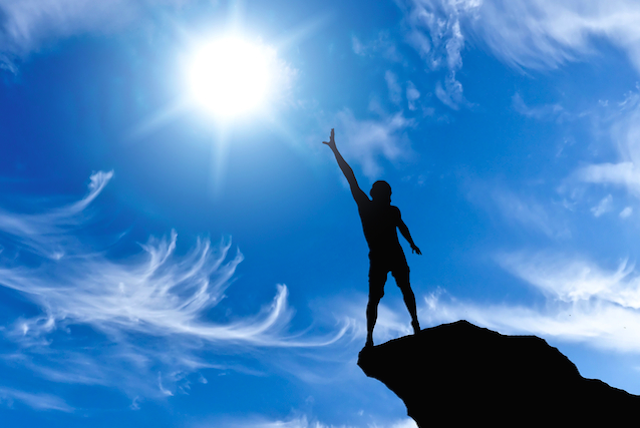
“Do the best you can, from where you are, with what you have, now.” ~African-American proverb
When I first started on my spiritual path, I desperately wanted to live in a more connected and satisfying way. I had a secret longing to know who I truly was and to finally reach my creative potential—not only as a writer, but also as a person. My intention was to express mastery through spirituality.
At the time, this made perfect sense. Spirituality, for me, was connecting to the creative part of myself—that invisible, powerful place where anything is possible.
A place where dreams are forged and destinies are realized. A place of poetic genius and inspiration. A place where masters live and breathe.
But back then, I didn’t understand that when we embark on this journey, we tend to use what we know—which is almost always ego-based. And the ego can’t get us to where we need to go.
This is because ego has way too much baggage. It weighs us down with things like fear, doubt, self-criticism, and anger. And yet, so many of us try the ego-based route first, as I did.
I egotistically believed that mastery was about pounding on my craft, practicing it with unrelenting determination and will. I made it more about me. It became an intellectual exercise.
I thought it was something that could be forced, conquered even. My motivation was all about achieving the goal—period!
It didn’t take me long to encounter the inevitable setbacks, shortcomings, and failures that come with this kind of thinking. And when I failed to express the master inside of me, I was extremely hard on myself.
The whole thing made me feel inadequate. The more I tried to force the master out, the less I felt like one. To make matters worse, all my teachers were still going on about “expressing mastery” and how easy it was.
It was about then that I stepped back and took a hard look at what mastery really meant to me—to my aspirations and to my life. I realized that this ego-based perspective had been creating limiting beliefs and habits that kept me stuck.
I feared my uncertain future and began to doubt my abilities. I allowed regret for past mistakes to overwhelm me and to crush my sense of self-worth. I even envied others for the rapid strides they seemed to be enjoying.
This ego-driven, high-octane way wasn’t the answer, at least, not for me.
So I decided to look at mastery in a different way—a healthier way.
Granted, I’m still not always successful, but I believe I have a better approach to it nowadays.
I’ve come to believe that mastery shouldn’t be about “being the best” or “knowing everything” or “flawlessness”—quite the opposite, in fact. Mastery is about the process of becoming, not the act of having become.
When mastery becomes ego-driven (as it did for me), we set ourselves up for failure. No only because the ego weighs us down, but because it always tries to win.
But, when your purpose is to live your best life, there is no winning or losing. No goal, no endgame.
There is only you being your best—at that moment, whatever that means to you.
This was immensely liberating. Imagine living your life from where you happen to be right now. To never again beat yourself up for not attaining some imagined goal suggested by somebody else.
I now understand that my spiritual development can’t be measured by my achievements, or lack thereof. The only yardstick is my own level of awareness and how I feel.
My new spiritual perspective and outlook on mastery has transformed me. It means that I can better appreciate who and what I am right now—which is a beautiful, ongoing process of discovery and growth.
Paradoxically, the less I measure, the more I end up growing, as a person and as a writer.
My goals have become more internalized, less tangible. They are also smaller, but no less important. They are about staying mindful and aware, without applying any judgments or criticisms to what is happening.
In this way, I’ve stopped trying to express mastery. Instead I work towards being a master of who I am in this instant—knowing that I am, right now, a perfect expression of me.
If you are feeling blocked or stuck, consider the possibility that your ego and your desire to master your life could be the very thing that is preventing you from getting to where you wish to be.
Instead of trying to force your dreams with an iron will and steadfast determination, try a gentler touch. Stay fully present and aware. Simply give this moment your very best.
Don’t worry about what you think you should be doing and where you should be going. Just be in the process of being you—right here, right now.
And ironically, by not seeking mastery, mastery will find you.
Reaching man image via Shutterstock
About Troy Roache
Since 2008 Troy has studied the works of our greatest teachers such as Christ, Buddha, Lao-tzu and Epictetus to apply their timeless wisdom into modern-day application. He blogs about creativity, personal development and happiness at his website troyproache.com. Troy resides on the south shore of Nova Scotia with his wife and daughter where he writes, studies and speaks.












 Though I run this site, it is not mine. It's ours. It's not about me. It's about us. Your stories and your wisdom are just as meaningful as mine.
Though I run this site, it is not mine. It's ours. It's not about me. It's about us. Your stories and your wisdom are just as meaningful as mine.